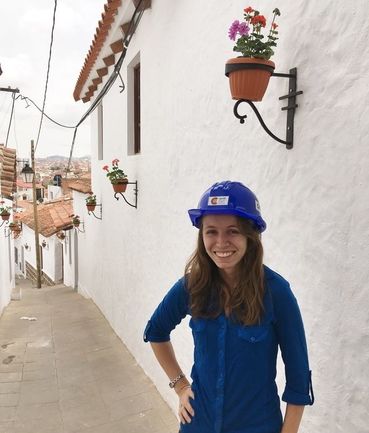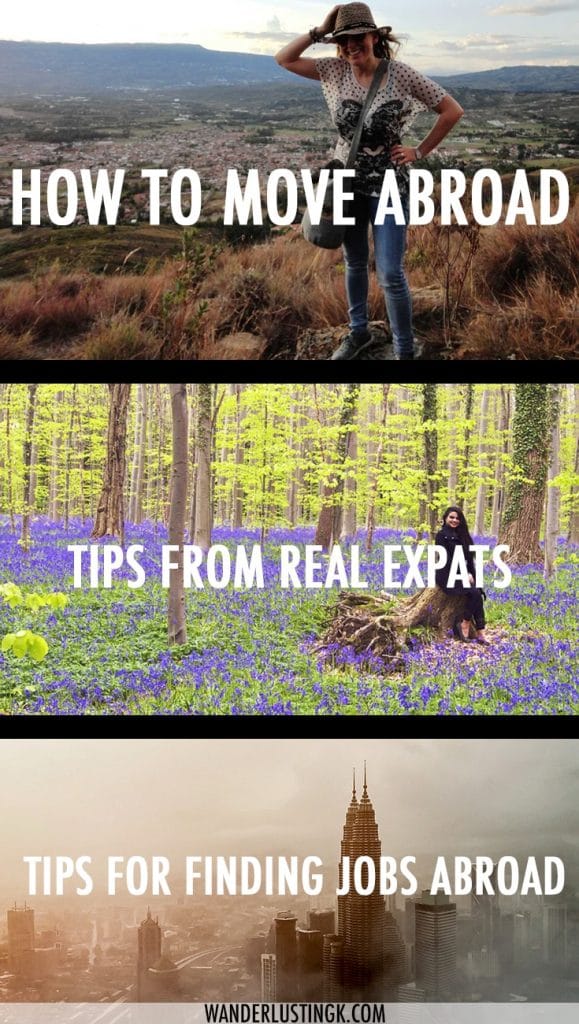Wondering how to become an expat? You need to find a job abroad! Here is a list of careers and advice to help you find international jobs! Finding jobs abroad is much easier if you’re a professional with significant job experience and/or have a Masters/Ph.D. Depending on your career, living and working abroad with the right work experience is possible if you’re trying to figure out how to move abroad. Keep reading for tips from real expats!
Contents
- 1 Contents:
- 2 Tips to live and work abroad
- 3 If you’re European…
- 4 How to work as an Engineer in Europe as a non-European (Jobs in Europe)
- 5 Moving abroad in finance/accounting and/orAdvancing within your company abroad
- 6 Moving abroad as a corporate executive
- 7 Moving abroad as a data scientist/programmer
- 8 How to work as a web developer abroad (in Malaysia)
- 9 How to Move to Australia: Moving to Australia with a job on the skill occupation list
- 10 Moving abroad with an international development job
- 11 Moving abroad as a medical student (Russia)
- 12 How to teach abroad for non-native English speakers & native English speakers
- 13 How to teach abroad for non-native English speakers
- 14 Have you lived and worked abroad? Any tips that you would add? If not, what country would you love to live in?
Contents:
- Top tips to live and work abroad
- If you’re European…
- Engineering jobs in Europe for non-Europeans
- Moving abroad in finance/accounting
- Moving abroad as a corporate executive
- Moving abroad as a data scientist
- How to work as a web developer abroad (Malaysia)
- Moving to Australia with a job on the skill occupation list
- Moving abroad with an international development job
- Moving abroad as a doctor
- How to teach abroad for non-native English speakers & native English speakers

Let me just say it: it’s not enough to say that “I’m over my country; I want to move overseas.” Moving abroad is a long process. It can be alienating as you are far from family/friends, but it can be very rewarding as it gives you a fresh start in a new country (which you might love living in!).
Most of the lists that I’ve found about working abroad focus on working abroad as digital nomads and/or teaching abroad.
This list is really intended for people who are committed to living abroad and becoming an expat long-term as most of these jobs require a significant time investment to get the degree and/or work experience required to be competitive.
Think of it this way: if you’re competitive in your own country, you might be competitive in a country you’d rather live in.
Tips to live and work abroad
Be good at your job. It seems so simple, but most of getting hired by a foreign company is about being an expert in your given area and being recognized for it. It might take some time to get into a good niche, but once you do, the job opportunities increase.
Learn languages. Although many countries use English for international business, not all do. Your ability to work abroad increases exponentially once you know more than one language. Picking the right language is the hardest part, however you need to think strategically about which languages are best for jobs in your area and where you want to move. You need to get to a conversational level for most employers to consider you (think B1-B2 level). Duolingo is a great start.
Learn new skills. Keeping your skillset fresh via learning new coding languages, taking workshops, or even refreshing your coursework from university can boost your resume, so when a recruiter searches for someone with that skill, you show up!
Look actively for jobs (even if you’re happy) and don’t be afraid to take the risk. The worst that happens is that you get rejected for not having a work permit. Best case scenario? They sponsor you to move abroad!
If you qualify for a second nationality, get it.
Keep in mind that moving abroad won’t be easy, but don’t give up! A lot of companies face significant visa hurdles to hiring foreigners, so it can be difficult to get sponsored as a foreigner, but it is possible.
Don’t obsess about the job posting requirements. Most job postings are a wish list, however you need to be qualified for 80% of the position requirements to be considered a viable candidate against local candidates.
Fill in your Linkedin Profile properly and use it actively. 93% of recruiters look on LinkedIn for candidates and a linkedin profile with a good description describing your job experience/personality is a great way to get noticed by recruiters.
Don’t move around companies too much as a professional. Taking job risks by changing jobs frequently have worked out for a couple friends, but many job require a specific number of years of experience (3/5/10/20 years are common benchmarks).
Get in touch with recruiters. I’ve been offered jobs in the UK, the Netherlands, Afghanistan (really), South Korea by recruiters! (Becoming an expat can be that easy!)
Negotiate your moving costs. Moving abroad is not cheap. Negotiate the first month (with the move) as part of your salary.
Think of living abroad as a long-term investment in you and your happiness. Unlike temporary visas (like working holiday visas), working in a country long-term often means that you can obtain citizenship and/or more rights as a permanent resident to return. This varies by country as certain countries (including Dubai) limit your ability to obtain citizenship, but if you want to travel more, living abroad is a great way to jumpstart it by having a better base for exploring the world.
If you’re European…
Congratulations, you’re able to work freely anywhere in the EU! Take advantage of it as the rest of us can’t.
How to work as an Engineer in Europe as a non-European (Jobs in Europe)

Photo credit: WhereisPriyanka.comPriyanka is an environmental engineer who has a Masters from another European country. Although it took some time to find an engineering job with sponsorship, it is easier for qualified engineers due to the Blue-Card visa scheme in the EU, which helps qualified professionals cut through some of the paperwork required to hire non-Europeans to work in the EU.
It is possible to find good overseas jobs for Indians if you have a good Masters or
Moving abroad in finance/accounting and/or
Advancing within your company abroad
If you work for an international company with branches all over the world, committing to a career within your company is a great way to move abroad. I know quite a few people who were able to work for 5-10 years for their company in their home country prior to transferring to foreign branches. (I know quite a few Americans working abroad that did it this way!)
It’s important to be clear with your managers that you’re interested in moving abroad as many people are not interested/able to take a transfer internationally.
Keep in mind that the first location offered to you might not be ideal, but showing that you’re interested in advancing your career abroad is a great way to be considered for other international transfers.
Some of this might require some short-term jobs that require a lot of travel abroad, however it can be a good way to show your commitment to relocating.
Moving abroad as a corporate executive
The key here is being recruited and/or actively applying for jobs. A good LinkedIn profile and willingness to take skill assessments may be necessary, but once you’re experienced, expect many job offers all over the world.
Don’t be afraid to consider international job offers as some might be the right challenge. Many jobs open to expats will explicitly include an extra bit for moving costs, so consider looking in job boards that list jobs for expats in your region.
Moving abroad as a data scientist/programmer
Being a data scientist is HOT right now, especially if you have a Ph.D in a hard science and the skills to match it. It’s easy than you would expect to get a job in this field if you’re a skilled programmer and researcher, which is how we arrived in France.
The only thing about working as a data scientist or some kind of highly skilled migrant is that your salary might be a bit lower than those competing in the same country, but if you’re keen on working abroad, just apply and see what happens.
If you’re experienced, expect recruiters coming after you–and don’t be afraid to apply for roles as well.
How to work as a web developer abroad (in Malaysia)

I am a web developer at a multinational company based in Kuala Lumpur, Malaysia. Being an Indonesian, I always find it difficult to travel to other countries outside of Southeast Asia due to visa requirements.
The hassle in getting visas have motivated me to find another approach to travel, which is through studying and working abroad. So that’s what I have been doing since I was 19 years old.
Taking advantage of the free 30-day tourist visa, I came to Malaysia in 2012 with nothing but my IT degree. Although I had a few part-time jobs during my college years in Australia and the Netherlands, I had no professional working experience. I was not sure if any company would hire a foreigner like me and is willing to apply a sponsored working visa.
After applying for various IT jobs, I managed to secure an interview during my second week of stay in KL and I was immediately hired. Luckily, I received the working visa before my tourist visa expired.
Here are the things I learnt about applying a job in Malaysia:
The trick is: MSC status!
MSC Malaysia status is given to local and foreign companies that follow certain criteria and guidelines. Companies with MSC status are qualified for incentives and privileges, including hiring non-Malaysians. I would advise to filter out non-MSC status companies as there is a huge chance that they don’t accept any foreigners or they are not willing to apply for the working visa.
Widen your search
When searching for jobs, don’t rely only on LinkedIn. Use local job portals such as JobStreet and Monster. LinkedIn is useful, but local job portals have more complete listings.
Discrimination is real
Despite being multicultural, discriminatory job ads are very common in Malaysia. Certain race is preferred over the others and this is usually visible in the ads. Don’t waste your time applying for jobs that contain such racist requirements. Chances are these companies do not value diversity.
Visa application is the employer’s responsibility
The company that hires you is responsible for applying the working visa on your behalf. They should bear the visa application costs as well. For MSC Status companies, it takes 2-3 weeks for the visa process to be completed.
My advice about getting a job in another country: don’t be too picky about the job and salary. Once you land yourself a job, it would be much easier for you to find a more suitable one in another company. Lastly, try to work in a multinational company that has branches in other countries. You may be able to move to a country you prefer through your company’s help.Amalia is an Indonesian living in Malaysia. Follow her adventures abroad here.
How to Move to Australia: Moving to Australia with a job on the skill occupation list

My husband and I migrated from South Africa to Australia in 2011. It was my dream to move here since I can remember (initiated by my father who always believed there was a better future for me in Australia).
When I started researching how to migrate to Australia, I was single and working in the 3D Animation industry with a background in Graphic Design. Finally one day, Graphic Design was on Australia’s Skills Occupations List – a changing list that shows which skills are needed in Australia. However, I would be limited to staying in Adelaide which was said to have less job opportunities than the bigger cities.
My husband was happy to move to Australia with me as he’d already lived and worked away from home. We were fortunate that his occupation (Java developer) was on the Skilled Occupations List and we wouldn’t be limited to living in any specific state. We learnt through his co-workers, who were also were looking at migrating, about a company called Dialog which sponsors Java developers in South Africa to migrate to Australia on 457 visas.
Thankfully and finally Dialog sponsored Kobus and I came over as a de facto partner. I also landed a great Graphic Design/Marketing role within two weeks of moving here.
It was a long process with its fair share of ups and downs, but it’s been absolutely worth it. Our advice is: Everything you need to know and do is on the www.australia.gov.au website – don’t waste your money on a migration agent and definitely don’t give up
Moving abroad with an international development job

I’ve been working in international development all over the world (including Ghana, Bangladesh, and Nepal). I’m currently on contract with Cuso International in Sucre, Bolivia. Cuso is a Canadian NGO that works with local partners worldwide. My partner organization is Escuela Taller Sucre, a technical college that teaches things like carpentry and metalworking, while specializing in restoring the old colonial buildings in Sucre.
My background is in Industrial Design, and I was hired to help the school open a store to sell their products. I also have a Master’s Degree in Design with a focus on international development, where I carried out research on devices for people with disabilities in Uganda.
I got the job because of my unique mix of international experience and my background in product design. I have applied to my last four international positions through Canadian organizations (which are often sponsored by the Canadian Government). The best thing about this is that they provide assistance with all visa documentation and cover expenses like flights and medical insurance.
One thing I noticed about working in Bolivia is the importance of interpersonal relationships. In my office, it’s rude to not say good morning to each person individually, and people will often ask about how your family is doing or send their regards to them (even if you see the person all the time).
If I had one piece of advice to share with others who want to move from working in a “developed country” to working in a “developing country”, I would say be flexible! Other cultures likely have a different idea of time, efficiency, commitments, and expectations than you are used to, so you simply have to “go with the flow”!Amanda is a Canadian working in international development in Bolivia. Follow her expat adventures here.
Moving abroad as a medical student (Russia)
After receiving a scholarship to go to medical school in Russia, Vivian moved to pursue her medical degree. She took 14 months of Russian language, which is a necessity for working in Russia as many people still don’t speak English.
This is her third language and Russian is not easy, however Vivian finds it an enjoyable place to work with patients that are understanding and kind.
Most of her colleagues are from the former Soviet Union, but it has been an enjoyable and challenging experience that has helped Vivian gain confidence as a medical student as well as give herself a comparison point to how it is back in Malaysia. If you’re open to a challenge and love languages, consider working in Russia.Vivian is a Malaysian working in Russia as a medical student. (Follow Vivian’s adventures here!)
How to teach abroad for non-native English speakers & native English speakers
If you’re a native English speaker, you have many options for teaching opportunities abroad as an English teacher with the right accreditation. (For more information about jobs abroad for English speakers, click here.)
How to teach abroad for non-native English speakers

If you were just thinking: “Only native speakers get those teaching jobs abroad,” then please stop and read this!
My mother tongue (Slovak) is one of the least marketable in the world, but I became a teacher in Colombia anyway. How? It was simple, albeit not easy. But if you have some patience, necessary skills and your CV ready, you can too!
In my case, an unrelated Bachelor’s degree was enough, combined with a language certificate and some previous experience as a teacher. After a lot of emails and about five interviews, I was hired as a French teacher at a private school north of Bogotá. While teaching is a hard job, it is rewarding.
If you too would like to become a teacher in Colombia, I recommend to first figure out where you want to live (if it is a big city, live somewhat close to where you work) and then send emails to all the schools in your vicinity.
There are websites for parents that list all the schools in the country and you can use these instead of only applying for jobs posted on job boards.
This has worked for me; I was contacted by a school that needed someone urgently and had no time to post an ad online! I had an interview on Saturday and started working Monday morning.
If you speak (and can teach) a language other than English, it is an asset you should definitely use. Compared to many others who offer English, perhaps you will be able to find work easier because of your specialization – maybe even at a bilingual school like the one I worked at.
If this inspired you, you can find more information on how to find a teaching job in Colombia in my detailed article
I hope that you found this interesting. If you’re interested in reading more tips about being an expat, click for more expat tips!
Have you lived and worked abroad? Any tips that you would add? If not, what country would you love to live in?


What a great comprehensive post with thoughtful advise. I’m a British expat living in Sydney Australia and LOVE it!
I’ve never really thought about the logistics of moving abroad just blindly fantasizes about it!
This was so informative and interesting. I wish my profession (nursing) was on this list! Your tips about learning another language are key. I’m sure this will help many people!
I debated adding it, but nursing is tough as there are a lot of language and technical requirements (although it’s good for temporary assignments abroad). (I heard a rant from someone else about accreditations for nurses in Europe). I think with enough investment in terms of language, you could easily get a job abroad as many countries have nursing shortages. 🙂 If you have advice on this, I’d love to hear it.
This is a great list, with some unique ideas I hadn’t thought of before. I left my last company just before they expanded overseas, my old boss ended up in London and I was kicking myself for not sticking around a bit longer.
Very helpful! I’m planning to move to Australia and I found this very through and helpful. Thank you for sharing this.
Great tips! I think languages are key, whether the language of the country or others – it´s a skill that never fails you!
This is a lovely post and very helpful to people who want to move abroad. I completely agree with your insights on engineers and finance streams. EU Blue card is a nice initiative by the EU and is often compared with the Green Card in US, but Blue Card still needs a lot of exposure and can often take a lot of time to process because of the bureaucracy. If anyone is planning to move to Germany, then definitely Blue Card is a great option!
Wow I love how Inspiring this post is and I never knew there were so many opportunities to be able to move abroad for work. I’m currently planning my move to Australia however just on a working holiday visa to see how things go.
This is so helpful! I currently live abroad as a student but I wanna be able to work abroat too later when I’m guraduated. This post provides a lot of useful information. Thanks for sharing! I’m definitely gonna save this one!
Thank you for this. I have a question. How do you get in touch with recruiters.?
Just on linkedin! I have many reach out to me as I have a full profile that I keep updated. 🙂 You can also apply to recruitment agencies for temp jobs.
hi Karen! Can you please let me know the best way to reach out to you for recruiter information? I’d love your advice on what recruitment agencies to start with. Thanks!
Hi Brooke, you can put out a little indicator on your linkedin that you’re open to recruiters, which is one way. I also recommend using the LION network to grow your network to find new recruiters who are in your field. It sometimes takes some searching, but I got an interesting job offer from one who just saw my profile by chance. Best of all, just apply. 🙂 Best of luck!
thanks!
I love this post, thanks so much for all the tips! I saw your in the Netherlands I am in the US currently and I am looking for positions in Amsterdam if you have any tips I’d greatly appreciate it as I am struggling to get past the visa hurdle!
HI!! I have always been in sales my whole life which includes fashion as well as real estate. I do not have a bachelor’s degree, how will that limit me in my search for a job? I am 64 and we are planning on moving to Italy and would like to get a work visa. Suggestions???
Toni
Apologies, but work visas can be tough to find! Best of luck!